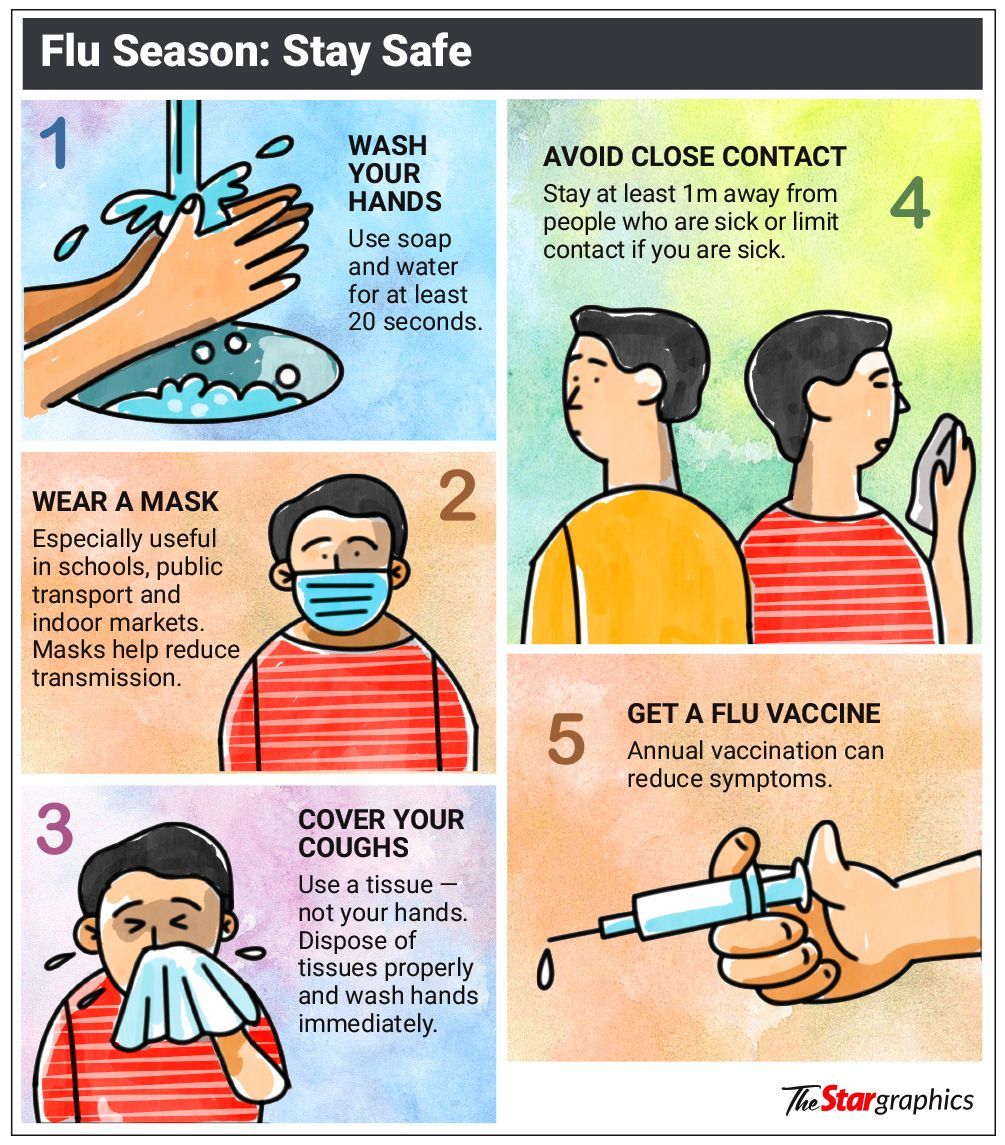Keeping the virus at bay
The monsoon season may bring an increase in influenza cases, even in tropical Malaysia. Get vaccinated to avoid contracting the highly contagious virus, say health experts. Business operators, meanwhile, want a safe workplace and to allow flexible options for their staff.
GEORGE TOWN: While the influenza virus tends to thrive during the colder months in countries with four seasons, tropical nations like Malaysia could still face a potential outbreak, says a virologist with Universiti Sains Malaysia (USM).
“Increased rainfall towards the end of the year, particularly in several states across Malaysia recently, often correlates with a rise in influenza cases,” said Dr Kumitaa Theva Das.
With the influenza virus constantly evolving, she noted that medical experts have recommended annual vaccinations to protect against the latest virus strains.
The World Health Organization (WHO) recommends people take the flu jab once every year, in February for those living in the Northern Hemisphere and in September for people in the Southern Hemisphere.
Dr Kumitaa said a common misconception is that influenza, often referred to as the “flu”, is no different from the common cold.
“In reality, influenza is a far more severe respiratory infection that can be life-threatening, especially for the high-risk groups.
“While cold symptoms are usually mild, influenza presents with more intense symptoms, including fever, severe muscle aches and extreme fatigue.
“In some serious cases, individuals may even experience chest pain, shortness of breath and loss of consciousness,” said Dr Kumitaa.
The Institute for Research in Molecular Medicine (Informm) senior lecturer added that some people are particularly susceptible to contracting influenza.
Young children, the elderly, pregnant women, people with chronic health conditions and those with weakened immune systems are all considered to be in the high-risk group, she noted.
“Because their immune systems are either still developing or less resilient, these individuals are at a higher risk of experiencing severe complications from the virus,” she explained.
She also said that influenza is highly contagious, especially during the initial stages when the symptoms begin to show.
An infected person can spread the virus through droplets released when they cough or sneeze, making close-contact environments such as schools and public transportation a prime setting for transmission, she added.
Public health specialist Prof Dr Sharifa Ezat Wan Puteh said influenza could cause pneumonia, adding that pneumonia is one of the leading causes of deaths in the country, especially among women and the elderly.
“Hence vaccinations against influenza are very important, especially among the high-risk groups such as the elderly, young children, disabled, homeless and immune-compromised people like diabetics and cancer patients.
“It could be dangerous for those in the high-risk categories because it could lead to lung complications,” she said.
Dr Sharifa Ezat also urged the government to increase allocations for flu vaccinations, given that they may be costly for the low-income groups.
USM family medicine specialist Dr Mastura Mohd Sopian said certain groups of people, including health workers and infants younger than six months, are at greater risk of developing severe symptoms and complications.
She, too, reminded the public that vaccination is one of the most effective measures against influenza.
There are other simple practices that can help reduce the risk of infection.
“Wash your hands frequently with soap and water to reduce the chance of infection.
“Avoid touching your eyes, nose and mouth as the virus can enter the body through these areas.
“Wear a mask in crowded places or if you are experiencing symptoms. Try to limit contact with individuals who are symptomatic to minimise exposure,” advised Dr Mastura.
Beware the influenza bug
GEORGE TOWN: Achoo! It’s the flu season, and the virus is making its rounds looking for new carriers during this monsoon season.With cases of influenza A or B on the rise, experts are warning of an outbreak as the virus is highly contagious and prone to spreading during the cold climate.
The common symptoms are high fever, body aches, cough or flu, and nobody is safe from the virus unless one is vaccinated.
ALSO READ: Get the flu vax to stay active again
Civil servant K. Charles, 38, was out for lunch when he suddenly felt extremely tired and had shortness of breath.“The feeling was like I got hit by a truck and could not continue riding my bike,” he said.
Charles stopped by the roadside to call his father, who then rushed over and sent him to the hospital.
“I was in bed for five days with a high fever and body aches.
“My test result came back positive for influenza A, which the doctors say is highly infectious and more severe than influenza B.“I was given antiviral drugs for the next few days. I lost my appetite and the doctor put me on intravenous (IV) drips.”
Charles said that after he recovered, he promptly went to take a flu jab.
ALSO READ: Protect your workforce during flu season, businesses urged
Jessie Lim, a clerk, 43, said she accompanied her son Jason Lee, 23, to a private clinic after he complained about feeling feverish and having body aches.
“At first, I thought he was merely having a fever, but to my surprise, his test showed that he had contracted influenza A.
“He was prescribed antibiotics and paracetamols and told to rest and take more fluids,” she said.
As the disease is highly contagious, Lim said everyone in her family wore masks to contain the spread of the virus and kept her son isolated.
Her anxiety did not end there, as Lim’s 76-year-old mother, who lives with them, also came down with fever, flu and cough.
“I was so worried, thinking that the virus had spread among our family members.
“Luckily, my mother later tested negative for influenza A or B. Both of them recovered after a few days.
“A week later, I took both my son and my mum to a clinic to get the flu vaccines for a whole year’s protection,” she said, adding that she herself had gotten vaccinated against the flu earlier.
Imran Hilmy, who works in the media, was not ready to put his eight-year-old daughter’s life on the line again after she recovered from Covid-19.
“When Maryam and her mother contracted Covid-19 during the pandemic, it was really painful for me to see both of them suffer through it.
“With the influenza season raging now, I did not think twice about getting my daughter vaccinated.
“She needs a boost to her immune system, especially during these colder months when both the flu virus and other respiratory illnesses tend to rise,” he said.
General practitoner Dr BS Goh said people of any age can catch the influenza virus.
The viruses that circulate widely in humans are the influenza A subtypes H1N1 and H3N2, along with influenza B, he said.
“Annual vaccination is recommended as this is the primary and most effective way to prevent influenza and influenza-related complications.”
Dr Goh also advised holidaymakers planning to travel to places with colder climates to get the flu jabs before leaving to avoid falling sick later.
Penang health committee chairman Danial Gooi said staying vaccinated will not only protect individuals but also help safeguard the vulnerable folk within the community.
“Parents, too, should be attentive and refrain from sending their children to daycare centres, kindergartens or schools if they are ill,” he added.
Gooi revealed that the cumulative number of influenza clusters in Penang rose to 27 by epidemic week (EW) 41 this year, up from 21 during the same period last year.However, he said the consultation rate for influenza-like illness (ILI) in EW 41 this year had seen a slight decrease from 8.4% in 2023 to 5.4% this year.
“Although the number of cases per influenza outbreak has shown a significant decline with no serious cases detected in any of the outbreaks, the public still needs to be vigilant about their health and seek immediate treatment if they feel unwell,” he said.
Source link
Related stories:
Get the flu vax to stay active again
Protect your workforce during flu season, businesses urged















